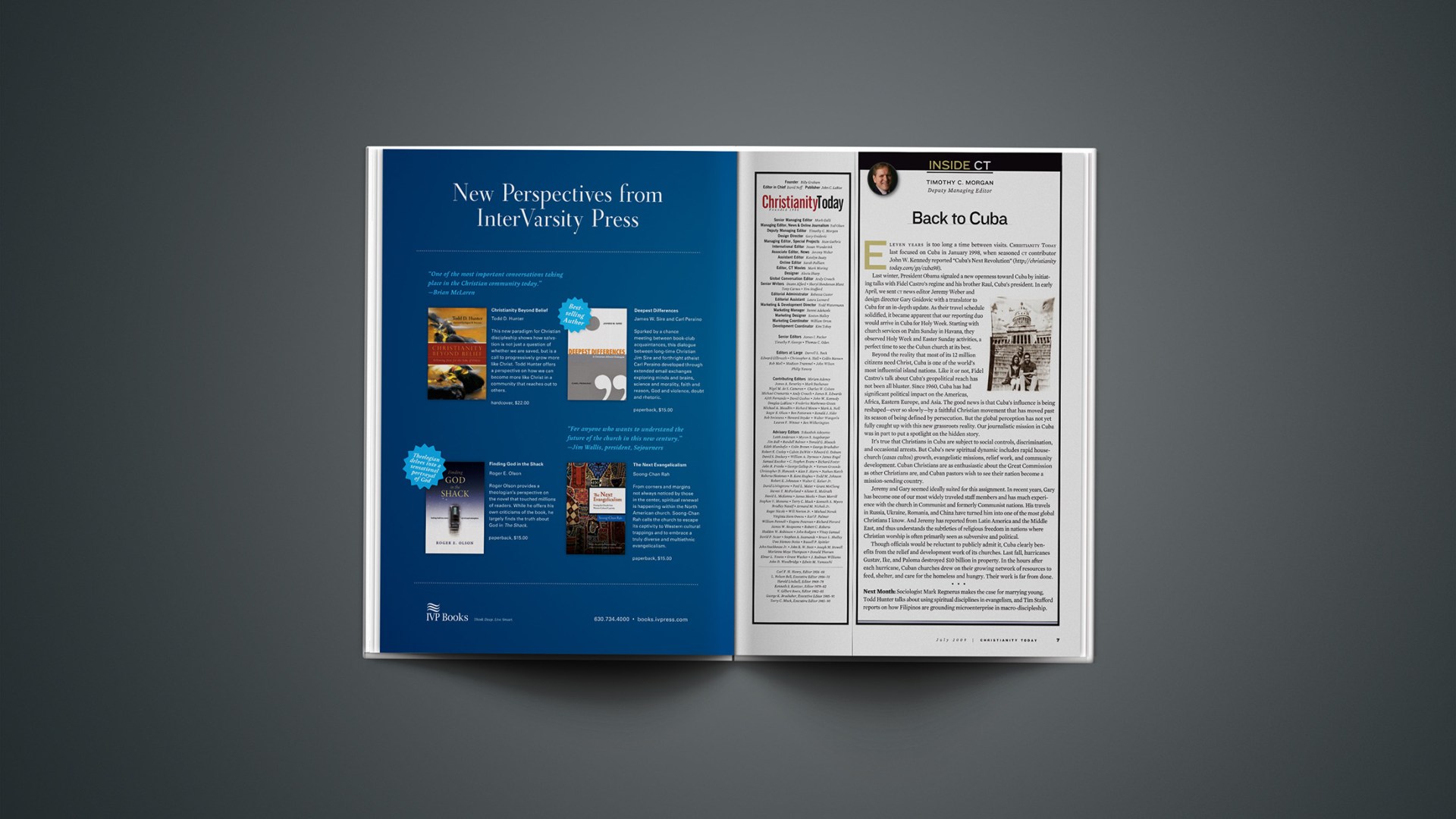Eleven years is too long a time between visits. Christianity Today last focused on Cuba in January 1998, when seasoned CT contributor John W. Kennedy reported “Cuba’s Next Revolution.”
Last winter, President Obama signaled a new openness toward Cuba by initiating talks with Fidel Castro’s regime and his brother Raul, Cuba’s president. In early April, we sent CT news editor Jeremy Weber and design director Gary Gnidovic with a translator to Cuba for an in-depth update. As their travel schedule solidified, it became apparent that our reporting duo would arrive in Cuba for Holy Week. Starting with church services on Palm Sunday in Havana, they observed Holy Week and Easter Sunday activities, a perfect time to see the Cuban church at its best.
Beyond the reality that most of its 12 million citizens need Christ, Cuba is one of the world’s most influential island nations. Like it or not, Fidel Castro’s talk about Cuba’s geopolitical reach has not been all bluster. Since 1960, Cuba has had significant political impact on the Americas, Africa, Eastern Europe, and Asia. The good news is that Cuba’s influence is being reshaped—ever so slowly—by a faithful Christian movement that has moved past its season of being defined by persecution. But the global perception has not yet fully caught up with this new grassroots reality. Our journalistic mission in Cuba was in part to put a spotlight on the hidden story.
It’s true that Christians in Cuba are subject to social controls, discrimination, and occasional arrests. But Cuba’s new spiritual dynamic includes rapid house-church (casas cultos) growth, evangelistic missions, relief work, and community development. Cuban Christians are as enthusiastic about the Great Commission as other Christians are, and Cuban pastors wish to see their nation become a mission-sending country.
Jeremy and Gary seemed ideally suited for this assignment. In recent years, Gary has become one of our most widely traveled staff members and has much experience with the church in Communist and formerly Communist nations. His travels in Russia, Ukraine, Romania, and China have turned him into one of the most global Christians I know. And Jeremy has reported from Latin America and the Middle East, and thus understands the subtleties of religious freedom in nations where Christian worship is often primarily seen as subversive and political.
Though officials would be reluctant to publicly admit it, Cuba clearly benefits from the relief and development work of its churches. Last fall, hurricanes Gustav, Ike, and Paloma destroyed $10 billion in property. In the hours after each hurricane, Cuban churches drew on their growing network of resources to feed, shelter, and care for the homeless and hungry. Their work is far from done.
* * *
Next Month: Sociologist Mark Regnerus makes the case for marrying young,
Todd Hunter talks about using spiritual disciplines in evangelism, and Tim Stafford reports on how Filipinos are grounding microenterprise in macro-discipleship.
Copyright © 2009 Christianity Today. Click for reprint information.
Related Elsewhere:
This article was posted with”Cuba for Christ—Ahora!” and “More Freedom But Not Free.” as part of Christianity Today‘s July cover package.
Christianity Today also has a special section on Cuba on our site, including:
Bearing the Cross: Freedom’s Wedge |What you can do to help persecuted Christians. (October 7, 2002)
Cuba No Es Libre | “Methodist church members visit Cuba without a permit and face fines up to $7,500 each” (July 8, 2002)
Cuba: After Castro | Church leaders worry that aid chaos will follow dictator’s death (October 1, 2001)
Cuba’s Next Revolution | How Christians are reshaping Castro’s Communist stronghold. (January 12, 1998)










